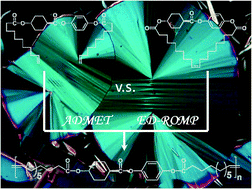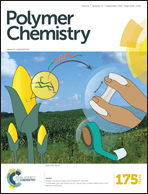An entropy-driven ring-opening metathesis polymerization approach towards main-chain liquid crystalline polymers†
Abstract
The known synthetic methods of preparing main-chain liquid crystalline polymers (MCLCPs) are rather limited to several polycondensation reactions. However, the nature of step-growth polycondensation endows the corresponding MCLCPs with relatively low molecular weights and broad molecular weight distributions. In this manuscript, an entropy-driven ring-opening metathesis polymerization (ED-ROMP) approach is for the first time applied in producing a MCLCP by polymerizing a macrocyclic olefin monomer containing one cyclohexanecarboxylic acid phenyl ester group as a mesogenic core and one icos-10-enedicarbonyl group as a flexible aliphatic chain. For comparison, Yamaguchi macrolactonization and ring-closing metathesis (RCM) methods are used to synthesize the macrocyclic olefin monomer, and it turns out that although the macrolactonization method can prepare a pure macrocyclic monomer, the RCM strategy is advantageous in providing a much higher overall reaction yield. Furthermore, compared with a traditional acyclic diene metathesis (ADMET) polymerization of mesogenic α,ω-diene, the ED-ROMP approach starting with the same monomer-to-catalyst ratio, releases no heat or volatiles during the reaction, and can efficiently provide MCLCPs with much higher molecular weights over a shorter reaction time.


 Please wait while we load your content...
Please wait while we load your content...